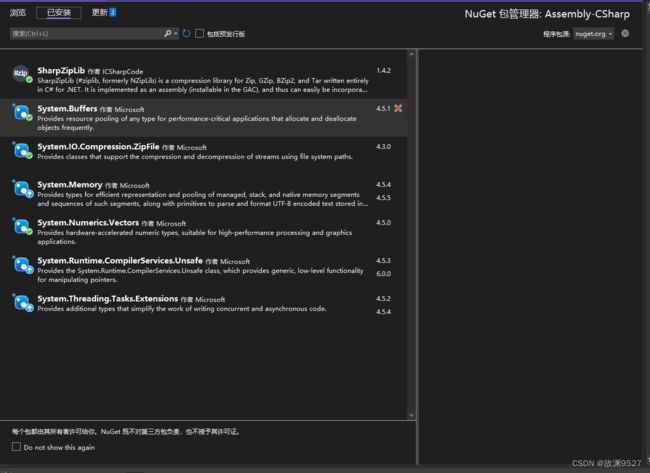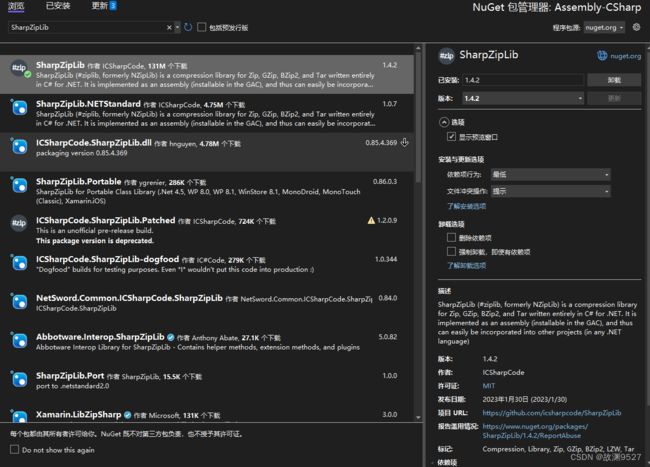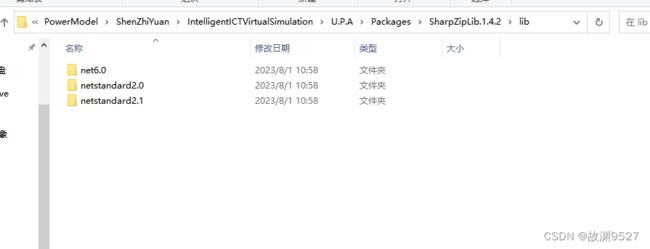untiy代码打压缩包,可设置密码
1、简单介绍:
用的是一个插件SharpZipLib,在vs的Nuget下载,也可以去github下载https://github.com/icsharpcode/SharpZipLib
用这个最主要的是因为,这个不用请求windows的文件读写权限,关于这个权限我搞了好久,到最后还不如这个好用
2、开始安装
这里介绍一下vs里的下载,首先在unity中随便创建一个脚本,然后双击打开进入vs,在上方工具栏中选“项目-管理NuGet程序包
然后会出现一个界面
点击上方的浏览-在搜索框中直接搜索SharpZipLib,然后会出现一堆的东西,不要犹豫,就是第一个(应该是吧),点击安装
安装好后进入unity,你会发现我们安装的.dll并不在unity工程中,那是因为vs给我们下载到了Packages中,我们进入Packages,找插件名称的文件夹,进去后选lib文件夹,然后根据自己用的API版本,拖不同的SharpZipLib.dll进unity中,拿我的举例,我的是.net2.1,那我就拿net2.1进去
至此,引用完成
3、简单使用
我们在unity中创建zip.cs脚本
using ICSharpCode.SharpZipLib.Checksum;
using ICSharpCode.SharpZipLib.Zip;
using System;
using System.Collections.Generic;
using System.IO;
using System.Linq;
using System.Web;
namespace VRS.Util
{
public class Zip
{
///
/// 压缩文件夹
///
/// 压缩文件夹的路径
/// 生成的zip文件路径
/// 压缩级别 0 - 9 0是存储级别 9是最大压缩
/// 读取文件的缓冲区大小
public void CompressDirectory(string dirPath, string fileName, int level, int bufferSize)
{
byte[] buffer = new byte[bufferSize];
using (ZipOutputStream s = new ZipOutputStream(File.Create(fileName)))
{
s.SetLevel(level);
CompressDirectory(dirPath, dirPath, s, buffer);
s.Finish();
s.Close();
}
}
///
/// 压缩目录
///
/// 待压缩的文件夹,全路径格式
/// 压缩后的文件名,全路径格式
///
/// 递归压缩文件夹方法
///
///
///
///
private bool ZipFileDictory(string FolderToZip, ZipOutputStream s, string ParentFolderName)
{
bool res = true;
string[] folders, filenames;
ZipEntry entry = null;
FileStream fs = null;
Crc32 crc = new Crc32();
try
{
//创建当前文件夹
entry = new ZipEntry(Path.Combine(ParentFolderName, Path.GetFileName(FolderToZip) + "/")); //加上 “/” 才会当成是文件夹创建
s.PutNextEntry(entry);
s.Flush();
//先压缩文件,再递归压缩文件夹
filenames = Directory.GetFiles(FolderToZip);
foreach (string file in filenames)
{
//打开压缩文件
fs = File.OpenRead(file);
byte[] buffer = new byte[fs.Length];
fs.Read(buffer, 0, buffer.Length);
entry = new ZipEntry(Path.Combine(ParentFolderName, Path.GetFileName(FolderToZip) + "/" + Path.GetFileName(file)));
entry.DateTime = DateTime.Now;
entry.Size = fs.Length;
fs.Close();
crc.Reset();
crc.Update(buffer);
entry.Crc = crc.Value;
s.PutNextEntry(entry);
s.Write(buffer, 0, buffer.Length);
}
}
catch
{
res = false;
}
finally
{
if (fs != null)
{
fs.Close();
fs = null;
}
if (entry != null)
entry = null;
GC.Collect();
GC.Collect(1);
}
folders = Directory.GetDirectories(FolderToZip);
foreach (string folder in folders)
{
if (!ZipFileDictory(folder, s, Path.Combine(ParentFolderName, Path.GetFileName(FolderToZip))))
return false;
}
return res;
}
///
/// 压缩文件夹
///
/// 压缩文件夹路径
/// 压缩文件夹内当前要压缩的文件夹路径
///
/// 读取文件的缓冲区大小
private void CompressDirectory(string root, string path, ZipOutputStream s, byte[] buffer)
{
//root = root.TrimEnd('//') + "//";
string[] fileNames = Directory.GetFiles(path);
string[] dirNames = Directory.GetDirectories(path);
string relativePath = path.Replace(root, "");
if (relativePath != "")
{
relativePath = relativePath.Replace("//", "/") + "/";
}
int sourceBytes;
foreach (string file in fileNames)
{
ZipEntry entry = new ZipEntry(relativePath + Path.GetFileName(file));
entry.DateTime = DateTime.Now;
s.PutNextEntry(entry);
using (FileStream fs = File.OpenRead(file))
{
do
{
sourceBytes = fs.Read(buffer, 0, buffer.Length);
s.Write(buffer, 0, sourceBytes);
} while (sourceBytes > 0);
}
}
foreach (string dirName in dirNames)
{
string relativeDirPath = dirName.Replace(root, "");
ZipEntry entry = new ZipEntry(relativeDirPath.Replace("//", "/") + "/");
s.PutNextEntry(entry);
CompressDirectory(root, dirName, s, buffer);
}
}
///
/// 解压缩zip文件
///
/// 解压的zip文件路径
/// 解压到的文件夹路径
/// 读取文件的缓冲区大小
public void Extract(string zipFilePath, string extractPath, int bufferSize)
{
//extractPath = extractPath.TrimEnd('//') + "//";
byte[] data = new byte[bufferSize];
int size;
using (ZipInputStream s = new ZipInputStream(File.OpenRead(zipFilePath)))
{
ZipEntry entry;
while ((entry = s.GetNextEntry()) != null)
{
string directoryName = Path.GetDirectoryName(entry.Name);
string fileName = Path.GetFileName(entry.Name);
//先创建目录
if (directoryName.Length > 0)
{
Directory.CreateDirectory(extractPath + directoryName);
}
if (fileName != String.Empty)
{
using (FileStream streamWriter = File.Create(extractPath + entry.Name.Replace("/", "//")))
{
while (true)
{
size = s.Read(data, 0, data.Length);
if (size > 0)
{
streamWriter.Write(data, 0, size);
}
else
{
break;
}
}
}
}
}
}
}
public void CreateZip(string sourceFilePath, string destinationZipFilePath)
{
if (sourceFilePath[sourceFilePath.Length - 1] != System.IO.Path.DirectorySeparatorChar)
sourceFilePath += System.IO.Path.DirectorySeparatorChar;
ZipOutputStream zipStream = new ZipOutputStream(File.Create(destinationZipFilePath));
zipStream.SetLevel(6); // 压缩级别 0-9
CreateZipFiles(sourceFilePath, zipStream, sourceFilePath);
zipStream.Finish();
zipStream.Close();
}
///
/// 递归压缩文件
///
/// 待压缩的文件或文件夹路径
/// 打包结果的zip文件路径(类似 D:\WorkSpace\a.zip),全路径包括文件名和.zip扩展名
///
private static void CreateZipFiles(string sourceFilePath, ZipOutputStream zipStream, string staticFile)
{
Crc32 crc = new Crc32();
string[] filesArray = Directory.GetFileSystemEntries(sourceFilePath);
foreach (string file in filesArray)
{
if (Directory.Exists(file)) //如果当前是文件夹,递归
{
CreateZipFiles(file, zipStream, staticFile);
}
else //如果是文件,开始压缩
{
FileStream fileStream = File.OpenRead(file);
byte[] buffer = new byte[fileStream.Length];
fileStream.Read(buffer, 0, buffer.Length);
string tempFile = file.Substring(staticFile.LastIndexOf("\\") + 1);
ZipEntry entry = new ZipEntry(tempFile);
entry.DateTime = DateTime.Now;
entry.Size = fileStream.Length;
fileStream.Close();
crc.Reset();
crc.Update(buffer);
entry.Crc = crc.Value;
zipStream.PutNextEntry(entry);
zipStream.Write(buffer, 0, buffer.Length);
}
}
}
}
}然后我们随便创建一个脚本测试
public class Test_ZipWrapper : MonoBehaviour
{
// Start is called before the first frame update
void Start()
{
Zip zip = new Zip();
//zip.CompressDirectory(, "D:/PowerModel/新建文件夹", 5,2048);
zip.ZipFileDictory("D:/PowerModel/新建文件夹", "D:/PowerModel/新建文件夹.zip");
//zip.Extract("D:/PowerModel/新建文件夹.zip", "D:/PowerModel/",2048);
}
}在这里我们主要调用的是ZipFileDictory方法,两个固定参数和一个可选参数,一个是要打压缩包的路径,一个是压缩包保存的路径,可选参数就是压缩包是否要上密码,该代码随便挂一个物体上运行,可以看到我们成功了
![]()
解压的话是用Extract,还是三个参数,要解压的压缩包路径、解压后的路径、和缓冲区,这个缓冲区和我们的TCP读流的缓冲区差不多,随便填,我这里填的是2048,你可以填别的数字,运行后,我们成功了
![]()
大家快去试试吧!
来源:Unity 工具 之 (SharpZipLib) 实现文件Zip的压缩和解压((可代密码)可一次压缩多个文件/文件夹)-蒲公英云




